- Home
- Emma Chase
Royally Yours Page 2
Royally Yours Read online
Page 2
“Where did he go?”
“Anywhere he wanted.” Miriam sighs. “They say he’s traveled all over the world climbing mountains, exploring jungles, and holds a record for deep-sea diving. He finds treasure.”
“Treasure? The Rourkes have as much money as we do.”
“But that’s why it’s so dreamy! He doesn’t find the treasure because he needs to—he does it just because he can. He gives it to charities—they say he once gave a rare diamond to an orphan boy begging on the street. Changed his life.”
Oh . . . that is rather dreamy.
“The old Duke kicked it a few months ago.” Miriam snaps her fingers. “They say the older one didn’t come home for the service, but the two brothers are supposedly very close. And now the younger brother is the Duke of Anthorp.”
I watch the boy for a moment as he smiles and chats with the old men crowding around him—like they’re trying to siphon off his youth through proximity. There’s an openness in his expression, an unguardedness in his stance that’s rare around here. He seems . . . kind. And genuine.
Parliament is going to eat him alive.
“What’s his name?” I ask.
“Thomas.”
My birthday ball is turning out to be a huge improvement from the luncheon. I feel luminous in my silver gown with my hair piled in shiny curls on my head, encircled by a flawless diamond tiara. And I haven’t heard the word warts once.
It’s an extravagant affair—long tables laden with caviar and sparkling Champagne in crystal flutes. The gilded mirrors on the ballroom walls reflect the rainbow blur of dancing gowns, glittery jewels, top hats and tails, and the lilting music of a twenty-piece orchestra is in fine form. The guests include a former American president, royals from every country in Europe and all the noble families of Wessco.
I stand to the side, along the wall, beside a marble column—my feet tapping in time to the music I won’t be dancing to.
Occasionally a well-wisher stops to chat—like Mr. Elvin Busey, a middle-aged, well-connected entrepreneur who wanted to tell me all about his new upholstery business, in case I wanted to invest. Once in a while, an upper-class boy passes by—the son of a Duke or an Earl or one of the several foreign Princes—each with expressions of greedy lust or squirrelly unease on their faces when they glance my way.
“That dress is the tops, Lenora!” My cousin Calliope gives me two thumbs up as she whisks past with her entourage.
Calliope’s hobby is writing detailed horror stories about the grisly death of every member of the royal family who stands between her and the throne. Including me.
These interactions aren’t genuine. They’re not real or sincere.
The rest of the guests tend to watch me from across the room, while trying to look like they’re not. But attention is tangible and weighted—something you can feel. As if by reflex, I stand stiffer, straighter, and my features slip into that unreadable mask of indifference.
“Are you having a good time, darling?” my mother asks.
She looks like a jewel tonight. Her gown is red velvet and there are winking rubies pinned all through her dark hair.
“Yes, I’m enjoying myself.”
The same way a Fabergé egg must enjoy itself while it’s admired, in its guarded museum glass case.
Laughter and chatter come from the group of young nobles behind us. Mother hears it too.
She wraps her arm around my lower back, squeezing with a gentle strength. “Your time will come, Lenora.”
“I know.” I shrug.
“I don’t mean when you become queen. I mean your time for laughter . . . for love. Joy and excitement—that will come for you too. I’m sure of it.”
“How can you be sure?”
There are old, shushed stories about my mother’s great-aunt Portia. They say she was a strange bird who sometimes had dreams that had a funny way of coming true.
She cups my jaw in her hands. “Because you, dear girl, are extraordinary in every way. It only makes sense that every part of your life will be extraordinary too.” She kisses my forehead. “I’m so proud of you . . . so proud to be your mother.”
I don’t spend a lot of time with Mother, not as much as I’d like. But when I do, she’s always able to do this—chase away the melancholy as easily as a fairy waving her wand.
“Thanks, Mum.”
She looks over my shoulder and her smile drops like a bomb. “Oh hell . . . the Marquis of Munster has the Queen Mother of Spain cornered. If he flashes that damn warty foot, we’ll end up in a bloody war.”
As my mother scurries away to prevent an international incident, I spot the young Duke of Anthorp again. He’s two columns down, leaning against the wall, his position almost a mirror image of my own. And because he can most likely feel me looking, his head turns my way—and he squints, like he still can’t see me well, despite the thick glasses on his face.
And then he’s strolling this way, hands folded behind his back. When he reaches me, he leans on the wall beside me, bowing his head, giving a start of a smile.
“Happy birthday, Princess Lenora.”
“Thank you, Duke Anthorp.”
He flinches. “Please, call me Thomas. Or Rourke. Every time I hear the title I look around for my father. He was a miserable old bastard when he was alive and I don’t expect two months of being dead would’ve improved his disposition, so the thought of him being close by is . . . disturbing.”
A chuckle swirls up my throat. What an oddly honest thing to say!
I nod. “How are you finding Parliament, Thomas?”
“Challenging. I’ve heard there are no friends in politics—only enemies and men you don’t yet know are your enemies. I’m beginning to see how accurate that is.” He shakes his head. “I just have to figure it out. I’m the youngest member of Parliament—it’s important that I be good at it.”
“Yes, I know the feeling.”
A swell of sympathy rises inside me for him. Like spotting a doe in the woods, when you know the wolves are near.
“The trick is to guard your opinions,” I tell him. “To not let anyone know what you’re thinking. You should work on your poker face.” And because he seems so young and alone, I offer, “I could help you with that. Show you the ropes, so to speak. Give you some pointers.”
And it’s as if I’ve offered him the world.
“You would do that for me? That’s very kind.” He looks off toward the dance floor and his voice drops lower. “I don’t have many friends—especially not here in the city. I’m more of a lone wolf, you know? A rebel.” He shrugs then and gives me a self-deprecating smile. “Well . . . an oddball may be more accurate. A strange duck.”
I smile. “I know that feeling too.”
Thomas adjusts his glasses. “May I ask you something?”
“Of course.”
“It’s your party—why aren’t you dancing?”
My eavesdropping sister pokes her head out from behind the column like a nosy squirrel popping out of a tree.
“She’s not allowed.”
“Why isn’t she allowed?” Thomas asks.
“Chewing gum,” Miriam explains—too happily.
“Yes, of course.” Thomas nods. “I see.”
And then his nodding head turns to a shaking one.
“No, wait, I don’t see. What’s chewing gum have to do with it?”
Yes, it’s as ridiculous as it sounds.
“A lady is like a lovely stick of chewing gum,” Miriam parrots. “Sweet and unblemished, but if you’re not careful, every lad around will take a taste.”
“But no decent man,” I continue, mimicking a crotchety old sod, “will want to put a used stick of gum in his mouth.”
Thomas seems to consider the idea seriously.
“That’s a load of bollocks, if I ever heard it. Who said that?”
“The Archbishop of Dingleberry,” I reply. “My father took it straight to heart.”
“Dingleberry, eh? The
name sort of says it all, then, doesn’t it?” Thomas winks.
And I laugh out loud.
Miriam does too, then she grabs Thomas’s wrist. “Now, Lenora may not be allowed to dance, but I am. And this song is one of my favorites. Let’s dance, Duke.”
Thomas seems surprised. “Well, all right.”
And Miriam drags him off to the dance floor.
Two dances later, they come back.
“We’ve concocted a plan!” my sister whisper-yells.
Oh no.
I’m already shaking my head. “The last time you had a plan, I ended up sitting next to Stinky Winky at dinner. No thank you, very much.”
Thomas looks back and forth between us.
“Stinky Winky?”
“The Viscount of Winkerton,” Miriam explains.
“The man smells like a pig’s arsehole,” I add.
Thomas chuckles.
“But this is totally different!” Miriam bounces on her toes. “This plan will actually work! I’ll create a distraction—I’m good at those. And you’ll get a chance to dance, Lenora.”
Thomas’s soft green eyes meet mine. “Everyone should get to dance on their birthday—chewing gum be damned.”
Excitement fizzes in my stomach and an unfamiliar wicked smile tugs at my lips.
“I shouldn’t.”
“Which is why it’s fun,” Thomas insists.
“I don’t know . . .”
“Oh, come on!” my tempting serpent of a sister whines. “For God’s sake, live a little.”
I glance around the room, searching for the prying eyes that always follow me, then I take a quick breath and nod. “All right.”
“Brilliant!” Miriam claps her hands, then looks at Thomas. “Wait for the signal.”
She rushes off to my father, pulling the King out to the dance floor. The bulbs of the palace photographer’s cameras flash, and you can practically hear the whole room sigh with the preciousness of watching the King of Wessco dance with his youngest daughter.
Thomas stands beside me, staring straight ahead, his hand just inches from mine. “Wait for it . . . wait . . .”
“Oh no!” Miriam screeches, and if all eyes weren’t on her and my father before, they are now.
“Now!” Thomas whispers, grabbing my hand and rushing us through the door behind us, as Miriam carries on about losing her beloved sapphire earring that was a gift from the King of Bermuda.
The room Thomas and I dive into is the mauve and gold drawing room, which was used in the corset days for all the fainting ladies who dropped like flies. But tonight it’s empty.
Thomas peeks through the crack in the door, listening—and after a moment he smiles. “The coast is clear.”
For most people, this would be a small, silly thing. But I’m not most people.
I’ve never disobeyed my father—I’ve never disobeyed anyone.
And I feel . . . alive. Maybe the most alive I’ve ever felt.
The beautiful music comes clearly through the walls—a fun, fast jig of a tune.
Thomas straightens his tuxedo jacket and his glasses. Then he bows, holding out his hand. “May I have the honor of this dance, Princess Lenora?”
And for the first time, to someone who is not my father or a direct relation, I reply, “I would be delighted.”
Thomas clasps our right hands together, squaring our arms, and rests his other hand on my waist. And beneath the dim, golden chandelier, we dance. We skip and spin, twirl and shuffle. We almost fall once, and Thomas steps on my toes . . . more than once.
“Ouch!”
“Sorry.”
“Ow!”
“My fault—won’t happen again.”
By the time the song ends, my head feels light and my heart races. Not in a swoony, romantic kind of way, but sillier—sweeter—how it would feel to dance with a dear brother. “You’re not very good at dancing, Thomas.”
He grins, wheezing. “Yes, I probably should’ve warned you. But I figured bad dancing was better than no dancing.”
He reaches into his pocket and removes a small metal device that he puts in his mouth and breathes on deeply. I’ve read about them—a new way of administering inhalant medicine.
He lets out his breath slowly, then shrugs, explaining, “Asthma.”
I nod as he slides the device back in his pocket. And when a new song begins, Thomas lifts his eyebrows. “Want to go again?”
I nod and put my hand back in his.
But we’ve only taken a few steps when a sharp scream comes from the outer room. And the music cuts off. And a still, eerie silence covers us like a blanket.
Thomas and I look at each other, and then we run for the door.
The guests are clustered on the dance floor. I push my way to the center and there, on the floor, my father cradles Mother in his arms.
“Anna, Anna!”
She doesn’t answer.
Her eyes are closed and her face is still and a trickle of red-black blood seeps from her nose.
“Anna . . .”
Miriam is curling into me, hiding her face against my arm. There’s a rush in my ears, a whole ocean crashing against my brain. And it’s as though I’m leaning over the edge of a cliff, about to plunge into the jaws of the dark, bottomless sea.
But then, from the other side, there’s a hand on my shoulder—warm and strong.
I tear my eyes from my parents and Thomas’s soft green gaze catches me. He holds on tighter—tethering me, anchoring me, letting me know I’m not alone, that he’s there.
And he won’t let me fall.
“YOUR MOTHER HAS DIED.”
Such sad words. Terrible words—the most awful words I ever heard.
“Your mother has died.”
The King seemed to age ten years as he spoke them. And I watched as all the joy was leached from Miriam’s dancing eyes.
“Your mother has died.”
Nothing would ever be the same. Nothing would ever be as fun-loving and wonderful as it could’ve been. No one would ever call me sweet or beautiful again.
A cranial aneurism, the doctor said. A freak occurrence, he explained. No warning signs, no treatment that could have prevented it.
My father is a good king, a gentleman.
But he is not a gentle man.
So the day after my mother died, he lectured us in firm, harsh tones on what was expected. We would walk every street in Wessco behind Mother’s casket, as was tradition. Mother was beloved and the people would be devastated, and it was up to us to lead them through their grief.
Our own mourning would be done privately—not in view of the maids or the secretaries or security—we must only show composure. Strength. Dignity.
“Your mother has died.”
And so, the morning of my mother’s funeral, the maid drew my bath. And alone in that porcelain tub, I slipped beneath the water and cried until there were no tears left inside me.
“Can I ask you something?”
A week after Mother’s funeral, we’ve come to Alfie’s for the weekend, fishing for carp in the large pond on his estate.
According to Father, it’s important for me to be skilled in all sorts of manly leisure activities—because that’s where deals really get done. At card tables and hunting grounds and fishing ponds. He’d have me on a rugby field if he thought he could get away with it.
“You can ask me anything, Lenora.”
My eyes dart beside me to Alfie, then back to my father. “It’s personal.”
“Go ahead.”
I look up at this man—my father, my king, my mentor—who most times I feel like I don’t know at all.
“Did you love her? Mother?”
He casts his line into the water and his steel-colored eyes—the same shade as mine—cloud over.
“I know you cared for her, but did you love her? Truly?”
My father has this way of imparting a lesson without making it feel like a lecture. His voice is a wise, resonant, barit
one—like the voice of God—that makes you want to follow and obey.
“Your mother was a good woman. Gracious . . . jubilant. When you sit on the throne, everyone wants a piece of you—a piece for the people, a piece for the press, a piece for Parliament, a piece for your spouse, a piece for your children. Eventually, you have to cut yourself up into pieces so small, you feel as if you’ve shortchanged everyone. But your mother never begrudged me.”
He turns his head and puts his hand on my shoulder. “It will not be that way for you, Lenora. Some part of your husband will always resent you.”
“Why?”
“You’re a smart girl—you tell me why.”
I think about all I know and all I’ve seen, and the answer isn’t difficult.
“Men don’t like to bow. To anyone. But especially not to a woman—to their wife.”
My father taps my shoulder and nods, then his gaze goes back to the pond.
“When the time comes for you to marry, we’ll find you a good, greedy man.”
“Greedy?”
“A greedy man will appreciate you for the wealth and power you give him. And because he’ll want to stay in your good graces, I’ll know he’ll treat you well.”
When you can’t think of anything clever to say, sarcasm will never let you down.
“Greed, wealth and power? Oh my—it’s like a fairy tale. I may swoon.”
My father reels in his line. “Don’t fill your head with fairy tales, child. Or thoughts of love. They are not for us. They will only bring you sorrow.”
With that, he walks away, to the footman to change his bait. I stare at his back.
“He didn’t answer my question,” I say to Alfie.
“’Course he did,” Alfie says kindly. “He loved your mother, very much.”
I tilt my head. “How can you tell?’
“Your father will never lie to you . . . and he didn’t tell you no.”
“Then why didn’t he just say yes?”
“Because love is bloody awful, Chicken. And fantastic. A beautiful, horrible, messy thing. It will make you feel like you can fly one day and rip your guts out the next. It’s complicated.” Alfie shrugs. “And your father wants you to have simple, as much as you can. Because he knows there’s already a whole crown of complications just waiting to be put on your pretty head.”

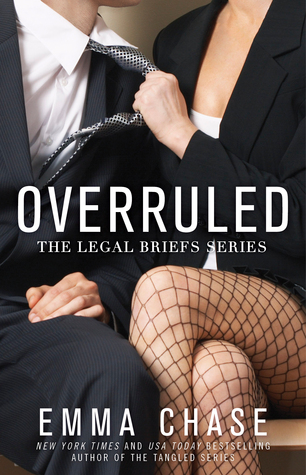 Overruled
Overruled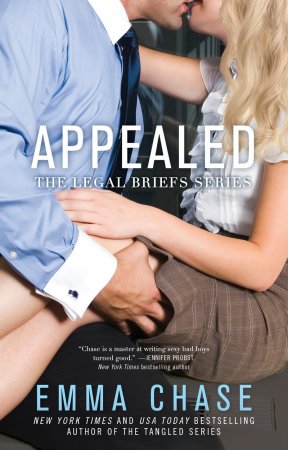 Appealed
Appealed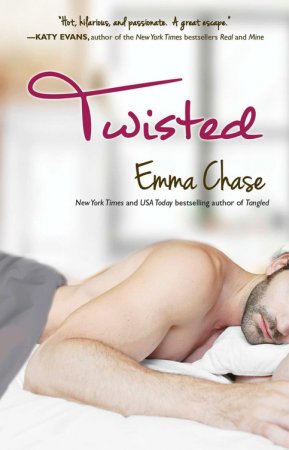 Twisted
Twisted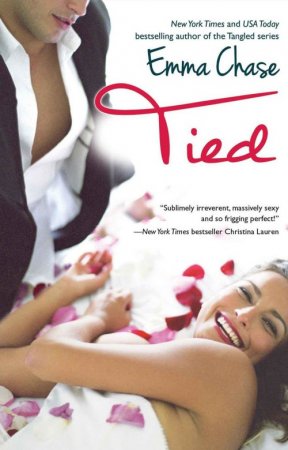 Tied
Tied Royally Screwed
Royally Screwed It's a Wonderful Tangled Christmas Carol
It's a Wonderful Tangled Christmas Carol Tangled
Tangled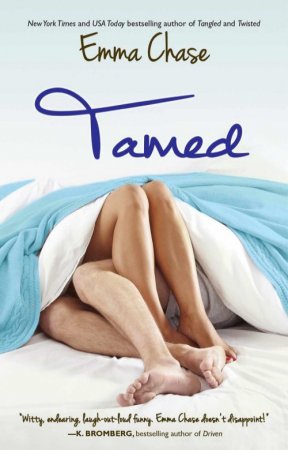 Tamed
Tamed Sidebarred
Sidebarred Sustained
Sustained Tangled Extra Scenes
Tangled Extra Scenes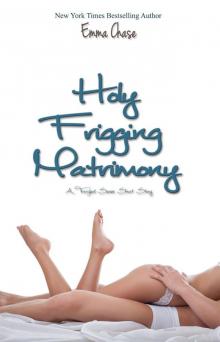 Holy Frigging Matrimony: A Tangled Series Short Story
Holy Frigging Matrimony: A Tangled Series Short Story Getting Schooled
Getting Schooled Royally Matched
Royally Matched Royally Endowed
Royally Endowed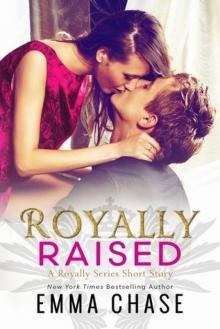 Royally Raised
Royally Raised Dirty Charmer
Dirty Charmer Getting Played (Getting Some Book 2)
Getting Played (Getting Some Book 2) Royally Yours
Royally Yours